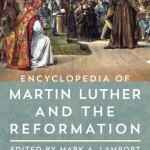I had to send regrets to two invitations to local interfaith iftars in the past week. Yet the word regret can’t fully capture the loss I feel this year at not being able to accept my Muslim neighbor’s act of inclusion and welcome as they celebrate the blessings of Ramadan.
Why?
 I’ve been reading in preparation for a weeklong faculty seminar on “Martin Luther’s Theology and the Jews” at the U.S. Holocaust Memorial Museum next week. In the afterword to their book, Martin Luther, The Bible, and the Jewish People, Brooks Schramm and Kirsi Stjerna write:
I’ve been reading in preparation for a weeklong faculty seminar on “Martin Luther’s Theology and the Jews” at the U.S. Holocaust Memorial Museum next week. In the afterword to their book, Martin Luther, The Bible, and the Jewish People, Brooks Schramm and Kirsi Stjerna write:
“Martin Luther never danced at a Jewish wedding. He never broke bread at Passover. He never shared a cup of Sabbath wine. He never studied Torah with a rabbi. He never held in his arms a newly circumcised Jewish boy. He never saw the anguish of expelled Jewish families vandalized at the hands of an irate Christian mob. He never smelled the smoke of burning Jewish martyrs.”
Luther had no meaningful relationships with Jews. The encounters he did have seemed to do little more than reinforce negative stereotypes and baseless fears that he harbored against them, learned from the culture in which he lived.
Coming in to this conversation in 2017 with an eye toward interfaith cooperation, teaching interfaith studies, and introducing young people to the power of interreligious encounters to lessen our collective anxiety and hatred, I have been newly struck by these old texts. It’s another expression of Robert Putnam’s arguments about social capital and the Interfaith Youth Core’s conviction that mutually inspiring relationships matter.
Schramm and Stjerna, along with Thomas Kaufmann, author of the other core text for our seminar, do not argue that such relationships with Jews would have necessarily changed the course of Luther’s thought, or of the history of anti-Semitism.
But the proposals that he made, which served as a functional to-do list for the Nazis’ final solution, were certainly made more possible by a lack of real human Jewish people in Luther’s daily life.
This is how dehumanization works, after all. You can much more easily demonize a whole category of “other” when you don’t know one of them in the flesh and soul of an authentic human life.
We need to dance at each other’s weddings.
Break sacred bread together.
Share Sabbath practices.
Study each other’s holy texts.
Hold each other’s babies.
See each other’s anguish.
Smell each other’s horrors.
Will doing all of that eradicate all of the hate? Will an interfaith iftar this Ramadan end Islamophobia? I regret to say that it probably won’t.
It will only help us see each other more clearly and treat each other a little bit more kindly.
And why not … we have to start somewhere.
Image mine.










